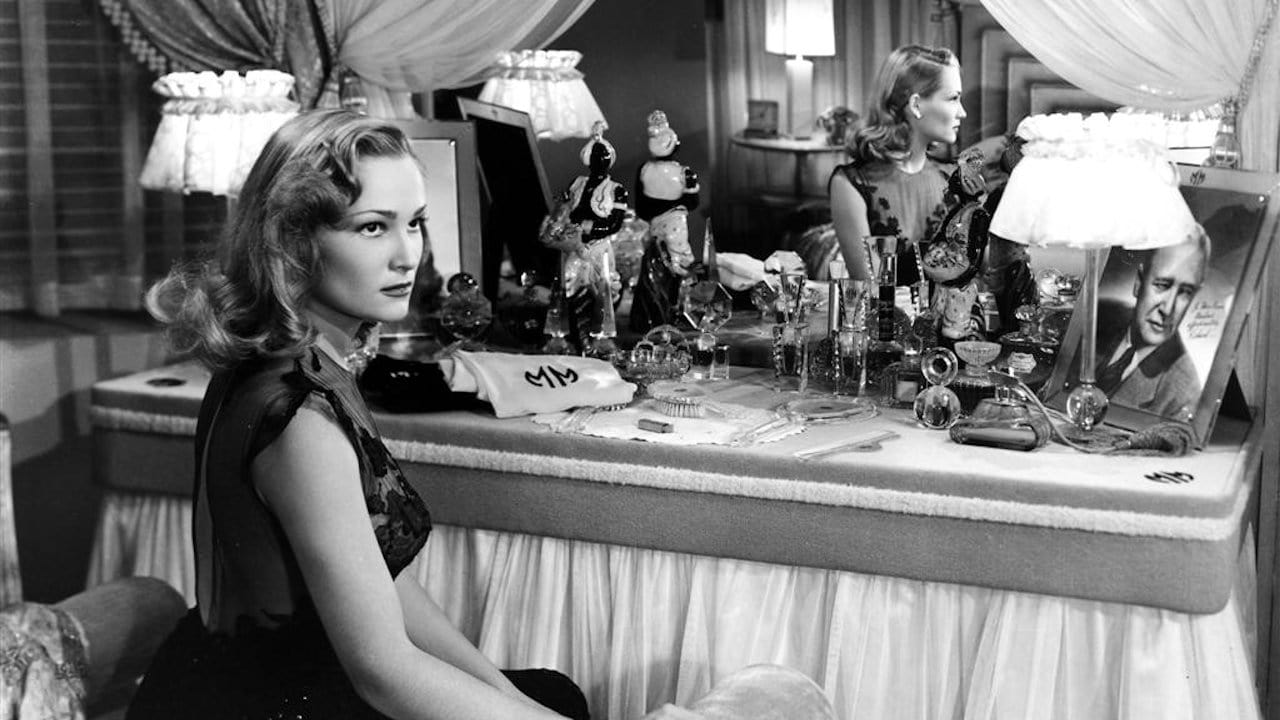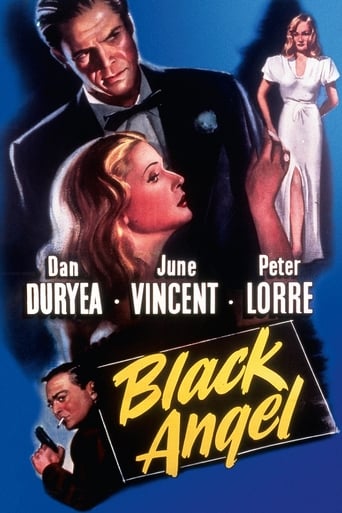Karry
Best movie of this year hands down!
BootDigest
Such a frustrating disappointment
Tacticalin
An absolute waste of money
Winifred
The movie is made so realistic it has a lot of that WoW feeling at the right moments and never tooo over the top. the suspense is done so well and the emotion is felt. Very well put together with the music and all.
judy t
I first saw Duryea long ago in Ministry of Fear where his bit dialing a phone number with a pair of scissors got my attention, and over the years his bad boy characters enlivened many a film. While not a deliberate scene stealer, he had a presence that took the spotlight away from the stars he supported, such as in the riveting final scene of Criss Cross. But in Black Angel HE is the star and that's what makes this film special. We first meet him at his worst, drunk and disorderly, a man drowning his sorrows after being dumped by his gorgeous, nasty wife, who has since been murdered. But when Duryea meets June Vincent, he shapes up and love blooms. We root for Vincent and Duryea to find the murderer so Vincent can divorce her cheating husband, marry Duryea, and live happily ever after in her cozy home in the suburbs of L.A. How very likable and nice are Vincent and Duryea. And how nice it is that neither of these likable people, mutually attracted as they are, acted on their feelings which, kept in check by the demands of sleuthing, are simmering just beneath the surface. However, the film's attempt to blend the story of a drunk reformed by love with a murder mystery does not quite succeed. But the schizophrenic screenplay does give Duryea the opportunity to deliver a star turn and he gives a dynamite performance. Black Angel is not considered a classic by the cognoscenti, but it's numerous virtues make it worthy of repeat viewing, especially when you're in the mood to spend quality time with Duryea and company.
dougdoepke
Duryea makes a great drunk. The way he looks in a couple of scenes makes me think twice about that social drink or two. Actually, the movie resembles a cheaper version of its Paramount contemporary The Blue Dahlia (1946) right down to the other Dowling sister (of the wicked eyes), this time Constance instead of Doris. The plots are pretty similar—tracking down the killer of a faithless woman, with an addled character playing a central role (William Bendix in Dahlia). In fact, the blonds Duryea & Vincent resemble a more musical version of Dahlia's Alan Ladd & Veronica Lake. I'm just sorry that the exotic Constance (Mavis) gets her neck wrung so early in this movie. That hank of hair is big enough to hide an army in.So, who did kill Mavis. There're not that many suspects; still, I was surprised at the outcome. There're also the expected staples of 40's noir— a surreal sequence (Duryea), a torch singer (Vincent), a guy on the run (Duryea), and some good nightclub scenes (but where's the cigarette smoke?). The atmosphere is appropriately noirish, but not as intense as it should be, which may be a reason the film tends to get overlooked. Nonetheless, the ending, with its undercurrent of the tragic, is unusually complex for a studio product. Unfortunately, director Neill died soon after the film's release, and after stepping up from Universal's atmospheric Sherlock Holmes series. Happily, his work, both there and here, shows a talent for interesting touches. But, it's June Vincent (Catherine) that surprised me. Her career specialized in blonde ice queens. Here, however, she brings genuine depth to what could have been a merely stereotypical role. Catch her many subtle expressions as the relationship with Martin (Duryea) evolves. In fact, she expresses an emotional conflict with Martin that makes me think she finally acts out of duty rather than heart.Anyway, the 80-minutes may not quite make it into the front rank of noir, but still remains a solid entry with a number of interesting angles. Besides, no film with two greats like Duryea and Lorre can afford to be passed up.
The_Void
The main things that personify the film noir genre are dark atmospheres and even darker characters. This film features shady examples of both; but neither is dark enough, which makes Black Angel very disappointing. The film is short at only eighty minutes and obviously didn't have a lot of budget; so as a result the plot is rather thin. We focus on the death of a woman and a man she was blackmailing; who gets blamed for her murder. His wife doesn't believe he did it and so sets out to prove his innocence; enlisting the help of drunken barfly and husband of the murdered woman along the way. June Vincent takes the starring role; but never really convinces as a femme fatale, and this brings the film down. She stars opposite Dan Duryea, who isn't particularly gritty as the leading man; and Peter Lorre, who is rather wasted. This film is directed by Roy William Neill; who is best known for his Sherlock Holmes films. This was actually Neill's last feature film before his death later in 1946; and it's disappointing that such a great director couldn't have gone out with something better. The main problem is certainly the plot; which never gets out of first gear and constantly fails to get the audience involved. Overall, this is a disappointing noir effort and I'd only recommend it to completists.
LCShackley
Director Neill, best-known for his string of Sherlock Holmes movies, made this interesting film noir just before his untimely death. He gets off to a good start with a clever opening shot involving Dan Duryea's profile, a Wilshire Boulevard sign, and a long zoom into an apartment window.We immediately meet the corpse-to-be, Mavis Marlowe, a tough broad who can't even be nice to her long-suffering maid. Her estranged husband Martin Blair (Duryea) is in the lobby trying to see her, but the doorman fends him off. And who's that scuttling into the elevator? Looks like Peter Lorre, and of course that means trouble.Poor Kirk Bennett, one of Marlowe's blackmail victims, shows up at the wrong moment and discovers Mavis's dead body. The cop (Crawford), eager to tie up the case, is happy when Bennett is quickly convicted and sent to death row. But he's innocent, or so claims his wife (June Vincent). In a credulity-stretching plot device, she enlists the help of Blair to find the real killer, who must of course be the sinister Lorre (a nightclub owner named Marko). You'd think she'd be in a hurry, considering her husband is on the fast track to the gas chamber, but she & Blair decide the best way to catch Marko is by putting together an act and getting hired by his night club. The tension begins to mount, until what seems like the denouement becomes the beginning of an unexpected final chapter with a nice twist.

